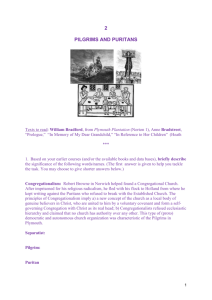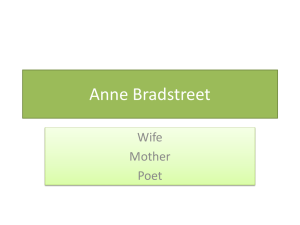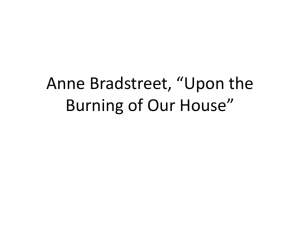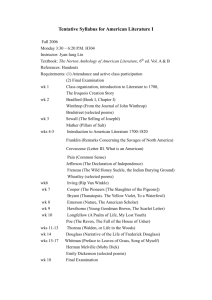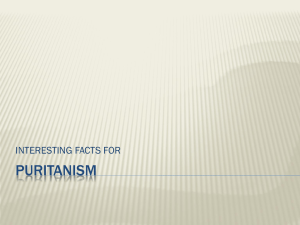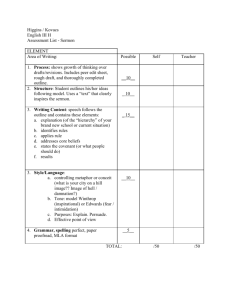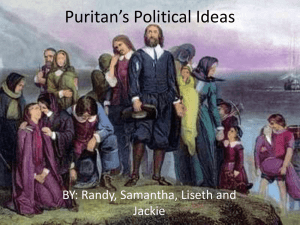BBL 3230 AMERICAN LITERATURE WEEK 4 THEMES OF MAJOR
advertisement
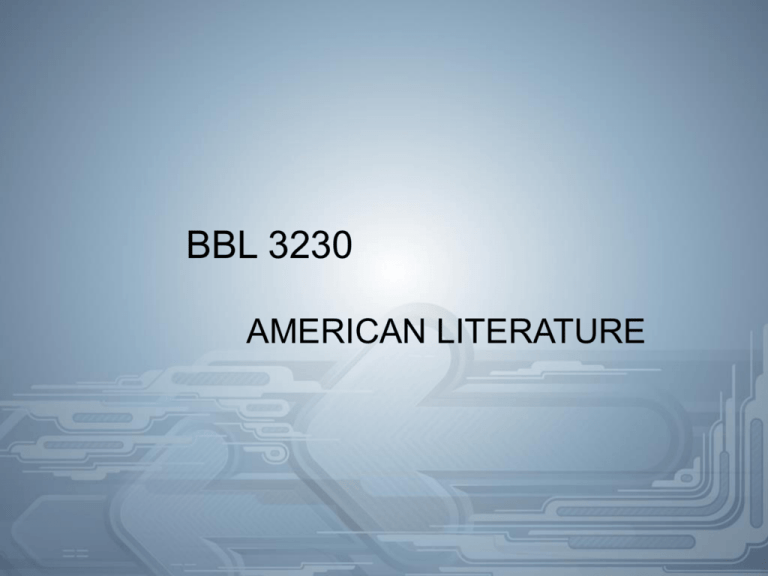
BBL 3230 AMERICAN LITERATURE WEEK 4 • THEMES OF MAJOR COLONIAL WRITERS (1600-1790) • -RELIGIOUS FAITH • -AMERICAN VERSUS BRITISH IDENTITY Themes of major Colonial Writers (1600-(1790) • Benjamin Franklin once noted that the business of making a nation restricted literary activity in Colonial America. • Franklin seemed to think that people needed a stable government and economy before they could make great advances in cultural pursuits such as literature, music, and painting. • Indeed, between the settlement of Jamestown, Virginia, in 1607 and the treaty ending the American Revolution in 1783, Americans did lag behind their English contemporaries in the production of epic poetry, drama, and fiction. Still, Colonial America did produce an impressive body of literature, much of it in the form of nonfiction prose, such as autobiography and sermon. • Some central themes emerge from this literature. Because of the nature of their endeavor, for example, Captain John Smith and other chroniclers of settlement in the 17th century often addressed the subjects of will and work, the relationship between humans and nature, and the differences between European and Native American cultures. • In this same century, Puritans such as Anne Bradstreet and John Winthrop wrote about their spiritual feelings and quests, Bradstreet in very personal poems and a journal, Winthrop in both a famous public sermon and an intimate journal. • This tradition continued into the following century, when Puritan Jonathan Edwards and non-Puritans such as Phillis Wheatley and John Woolman reflected on their faith in poems and journals. • Other writers, including Benjamin Franklin and Thomas Jefferson, produced more public literature designed to entertain people or further their political aims. • In its emphasis on human potential and reason, much of this literature reflects the prevailing sentiments of its era, often called the Enlightenment or the Age of Reason. John Smith, 1580-1631 • Smith wrote many accounts of his experience in Virginia and New England, including The Generall Historie of Virginia, New England, and the Summer Isles. • In these works, especially in his account of fighting off 200 Native Americans while using one as a shield, Smith provided early examples of the tall tale. • Furthermore, his discussions of leadership and survival in the Virginia wilderness make him one of the first American writers to explore the themes of self-creation, practicality, industry, self-reliance, and cultural contact. • In many ways, he is a precursor to Benjamin Franklin, Ralph Waldo Emerson, Walt Whitman, and Mark Twain. Edward Taylor • Now regarded one of the major poets of the Puritan era, Edward Taylor was known primarily as a minister in his lifetime. Indeed, most of his poetry was not discovered and published until the 20th century. • Like other Puritan writers, such as John Winthrop and Anne Bradstreet, Taylor devoted much of his work to introspection as he attempted to understand and fulfill his role as a Christian. • Taylor's "occasional poems," particularly "Huswifery" and "The Ebb & Flow," resemble those of the other great American poet of the period, Anne Bradstreet, in their use of domestic imagery. • Unlike Bradstreet, however, Taylor wrote in the tradition of the English metaphysical poets John Donne and George Herbert, known for their conceits, compression of material, and challenging syntax. Philip Freneau 1752-1832 • Although he wrote several poems about nature, including "The Wild Honey Suckle" and "On a Honey Bee," Philip Freneau achieved distinction primarily for his political verse, which earned him the nickname "The Poet of the American Revolution." • In his bitter denunciations of monarchy and his celebrations of America's natural and political glories, Freneau expressed a bold nationalism that was common during the era and can be found in the works of J. Hector St. John de Crevecoeur and Benjamin Franklin. Phillis Wheatley 1753-1784 • The first black American to publish a book of poetry, Phillis Wheatley wrote in a style characteristic of the 18th century. • Like Alexander Pope and other English writers of the 18th century, she favored highly stylized poetry, characterized by lofty subject matter, elevated diction, classical allusions, and heroic couplets. • Wheatley also is known for her religious verse, including poems such as "Thoughts on the Works of Providence" and "To S.M., a Young African Painter, on Seeing His Works." John Winthrop 1588-1649 • After William Bradford and his Separatist Puritans left England around 1609 and later sailed to America in 1620, many English Puritans continued to believe that they could reform the Church of England, which they believed was corrupt. • In 1630, however, about 700 of these Puritans, led by John Winthrop, followed Bradford's example and traveled to America, where they set up the Massachusetts Bay Colony. • Puritan scholars have suggested various reasons for this exodus. Perry Miller has argued that Winthrop and other Puritans saw their project as an "errand into the wilderness" and believed they could reform Christianity by setting up a model of God's kingdom in America. • Other scholars, notably Andrew Delbanco, have suggested that many of the Puritans who migrated in the 1630s had other goals; some, for example, apparently were fleeing the corrupt morality of England. • The Model of Christian Charity, Winthrop uses tenets of Christianity and his own sense of reason to write a political sermon designed to prepare the Puritans for their difficult project in America. • This public work not only explains the Puritans' belief in a covenant with God, but shows the pragmatism that helped early settlers survive in the wilderness. • What is more, this work foreshadows other American writers' interest in community, as Delbanco has noted: "His Arabella sermon is the first great communitarian statement in American literature-a 'pre-libation,' as the Puritans would have called it, of Edwards, of Melville, of Whitman in their hortatory modes. • And it shares with such successors the fact of its fleetingness, which is why it is the best measure of how quickly and how far the Puritan aspiration fell" . • Of course, the very fact that Winthrop made this statement may be read as a sign that he expected disunity; one is more likely to plead for love and cooperation among a divided people than among an already unified group. • Winthrop's journal, which he composed in the 1630s and 1640s, also reveals details of Puritan politics and theology, particularly in its treatment of the dissenters Anne Hutchinson and Roger Williams. • Finally, "John Winthrop's Christian Experience" belongs to the class of Puritan introspective writing, a genre later used by Anne Bradstreet and Jonathan Edwards.


